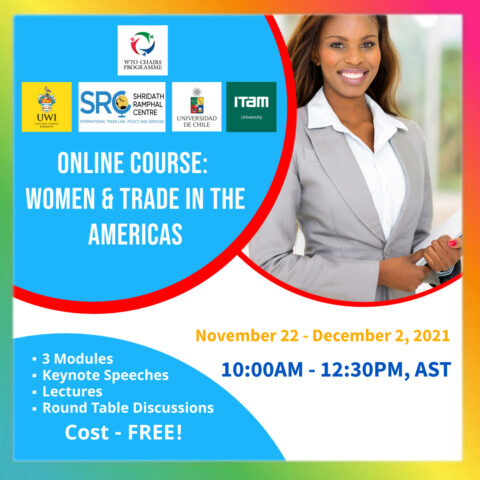The University of the West Indies, Cave Hill Campus. Tuesday, November 23, 2021— The Shridath Ramphal Centre (SRC) at the University of the West Indies, Cave Hill campus is collaborating with the Instituto Tecnologico Autonomo de Mexico (ITAM) and the University of Chile to offer the Women and Trade in the Americas Training Programme which focuses on building capacity in the formulation and implementation of an inclusive trade policy that empowers women. The online course is organized through the WTO Chairs Programme, which was developed to support and promote trade-related academic activities by universities and research institutions in developing and least-developed countries.
The 9-day programme which began on Monday 22nd November 2021, concludes on Thursday 2nd December 2021. It is designed as an introduction to the gender equality dimensions of trade in the Americas and provides an overview of the relationship between trade and women from a policy and legal perspective.
At the virtual opening session of the module, Director of the Shridath Ramphal Centre, Dr. Jan Yves Remy, noted that the training programme supports the Centre’s mandate as a world-class centre for training, research and outreach on trade and development issues in the Caribbean.
“This course, coming as it does on the brink of the 12th Ministerial Conference in Geneva, could not be better timed. It unites students from around the region on a very important new issue on the WTO agenda – ensuring that women are supported and represented in trade negotiating outcomes. We are grateful to the sponsors and to the WTO Chairs Programme for allowing us to bring the issue of trade and gender to this region, through a training module.” Dr. Remy, shared.
Dr. Remy was joined by fellow Chairs, Felipe Munoz from University of Chile, Dr. Amrita Bahri, Instituto Tecnologico Autonomo de Mexico, Werner Zdouc, of the WTO Secretariat Representative and WTO Sponsors of the programme from The Netherlands and France.
The course spans a myriad of trade and gender related topics in the Americas including trade agreement negotiations, E-commerce and digital opportunities, health issues including COVID-19 and allows participants to engage with eminent experts regarding historic and novel challenges faced by women in global trade.
Participants of the training programme include students, researchers, policymakers, businesspersons, and personnel in national, regional, and international organizations with mandates in trade and/or gender.
By the end of the course, these persons should be made aware of the need to incorporate gender into trade policy development as an essential prerequisite for inclusive and sustainable development in Latin America and the Caribbean.


